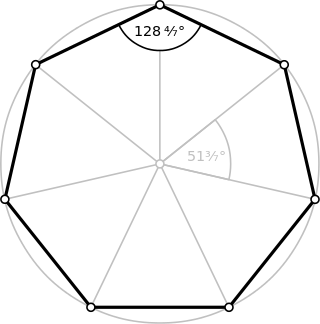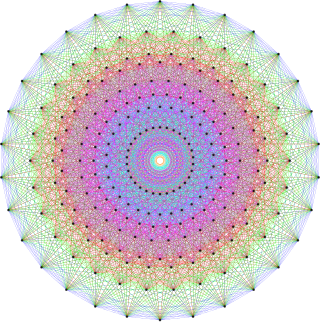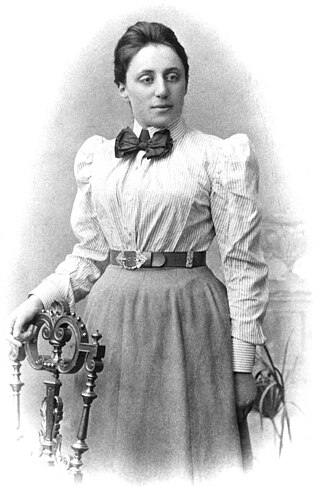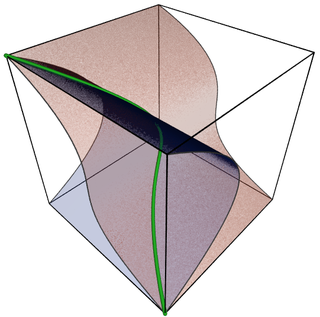In mathematics, the group algebra can mean either
- A group ring of a group over some ring.
- A group algebra of a locally compact group.
In mathematics, the group algebra can mean either

In mathematics, an associative algebraA is an algebraic structure with compatible operations of addition, multiplication, and a scalar multiplication by elements in some field K. The addition and multiplication operations together give A the structure of a ring; the addition and scalar multiplication operations together give A the structure of a vector space over K. In this article we will also use the term K-algebra to mean an associative algebra over the field K. A standard first example of a K-algebra is a ring of square matrices over a field K, with the usual matrix multiplication.

In mathematics, a field is a set on which addition, subtraction, multiplication, and division are defined and behave as the corresponding operations on rational and real numbers do. A field is thus a fundamental algebraic structure which is widely used in algebra, number theory, and many other areas of mathematics.

In mathematics, a Lie algebra is a vector space together with an operation called the Lie bracket, an alternating bilinear map , that satisfies the Jacobi identity. The Lie bracket of two vectors and is denoted . The vector space together with this operation is a non-associative algebra, meaning that the Lie bracket is not necessarily associative.
Radical may refer to:

In mathematics, rings are algebraic structures that generalize fields: multiplication need not be commutative and multiplicative inverses need not exist. In other words, a ring is a set equipped with two binary operations satisfying properties analogous to those of addition and multiplication of integers. Ring elements may be numbers such as integers or complex numbers, but they may also be non-numerical objects such as polynomials, square matrices, functions, and power series.
In mathematics, an algebraic structure consists of a nonempty set A, a collection of operations on A, and a finite set of identities, known as axioms, that these operations must satisfy.

Amalie Emmy Noether was a German mathematician who made many important contributions to abstract algebra. She discovered Noether's First and Second Theorem, which are fundamental in mathematical physics. She was described by Pavel Alexandrov, Albert Einstein, Jean Dieudonné, Hermann Weyl and Norbert Wiener as the most important woman in the history of mathematics. As one of the leading mathematicians of her time, she developed some theories of rings, fields, and algebras. In physics, Noether's theorem explains the connection between symmetry and conservation laws.
In mathematics, an algebra over a field is a vector space equipped with a bilinear product. Thus, an algebra is an algebraic structure consisting of a set together with operations of multiplication and addition and scalar multiplication by elements of a field and satisfying the axioms implied by "vector space" and "bilinear".
Torsion may refer to:

Algebraic varieties are the central objects of study in algebraic geometry, a sub-field of mathematics. Classically, an algebraic variety is defined as the set of solutions of a system of polynomial equations over the real or complex numbers. Modern definitions generalize this concept in several different ways, while attempting to preserve the geometric intuition behind the original definition.

In algebra, ring theory is the study of rings—algebraic structures in which addition and multiplication are defined and have similar properties to those operations defined for the integers. Ring theory studies the structure of rings, their representations, or, in different language, modules, special classes of rings, as well as an array of properties that proved to be of interest both within the theory itself and for its applications, such as homological properties and polynomial identities.
Ideal may refer to:
The term center or centre is used in various contexts in abstract algebra to denote the set of all those elements that commute with all other elements.
The word 'algebra' is used for various branches and structures of mathematics. For their overview, see Algebra.
In mathematics, the term socle has several related meanings.
In mathematics, there are many types of algebraic structures which are studied. Abstract algebra is primarily the study of specific algebraic structures and their properties. Algebraic structures may be viewed in different ways, however the common starting point of algebra texts is that an algebraic object incorporates one or more sets with one or more binary operations or unary operations satisfying a collection of axioms.
Algebra is the study of variables and the rules for manipulating these variables in formulas; it is a unifying thread of almost all of mathematics.

In mathematics, more specifically algebra, abstract algebra or modern algebra is the study of algebraic structures. Algebraic structures include groups, rings, fields, modules, vector spaces, lattices, and algebras over a field. The term abstract algebra was coined in the early 20th century to distinguish this area of study from older parts of algebra, and more specifically from elementary algebra, the use of variables to represent numbers in computation and reasoning.
A characteristic is a distinguishing feature of a person or thing. It may refer to:
In mathematics, the homology or cohomology of an algebra may refer to